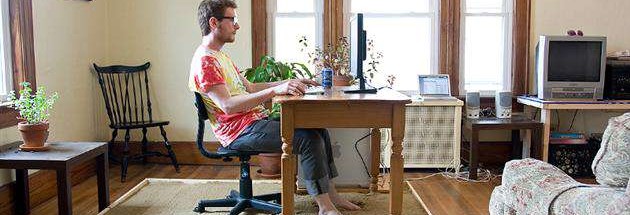There’s no doubt that working from home presents convenience and flexibility that one wouldn’t have when working at the traditional office. You have a quiet environment, free from interruption by noisy co-workers and visitors. Indeed, that gives you the advantage of accomplishing much more than when you’d be working from a regular office.
That however doesn’t mean that you don’t get distracted when working at home. There’s a fair share of interruptions when working at home, sometimes to a higher degree than when you’d be working in the office. That said, you can manage home office distractions and achieve high productivity by being well organized and observing a high level of discipline. Here are some easy yet effective steps on how to manage distractions when working from home.
1. Organize your work Environment
It’s important that you choose the right environment for your home office and organize it in a way that helps you to concentrate. While your bedroom would be a quiet environment to work from, you’d have to deal with the enticement of taking a nap after working for a while. You should choose an environment that supports a real work setting. Make sure your desk is free from unnecessary clutter that would keep on shifting your attention from work schedule. You may not be able to focus when working in a disorganized office space.
2. Craft a Work Routine
Although working at home is supposed to give you freedom, ideally being your own boss, you’d need to craft a work routine that suits your lifestyle. It doesn’t have to be a tough program. You simply want a routine that works for you and helps you to increase productivity. You may for instance train yourself on waking up early in the morning where you can answer your emails, peruse through headlines and update your social media accounts. You may want to have a few minutes for exercise after which you can work for about three hours before taking a break and so on. Whatever routine you adapt, make sure it works towards your goals.
3. Scale down on Watching Television
While watching TV makes you feel connected to the outside world, too much of it can be addictive, thus affecting your productivity. You also don’t want to focus too much on the news as this can be stressful and affect your concentration. The best thing would be having a scheduled time for TV such as during your lunch break or after working hours.
4. Handle one task at a time.
While multitasking sounds like a good idea towards accomplishing much task, there’s a downside to it. The tricky part is that you end up failing to accomplish your tasks unlike when you’d be handling one task at a time.
5. Set Goals
Sometimes you may find that you have a lot to do and you don’t know where to begin, because probably there isn’t enough time left before the deadline. It happens to everyone and unless you have set goals or targets that you can accomplish within a specific duration, then you’re going to be working under pressure most of the time.
6. Exercise and Have Enough Rest
Lack of exercise and enough rest can lead to fatigue or low energy levels, affecting your productivity. Make sure you have enough sleep, go out for jogging or a walk and remember to take plenty of water to remain hydrated. This will help you from feeling exhausted and increase the level of concentration.
